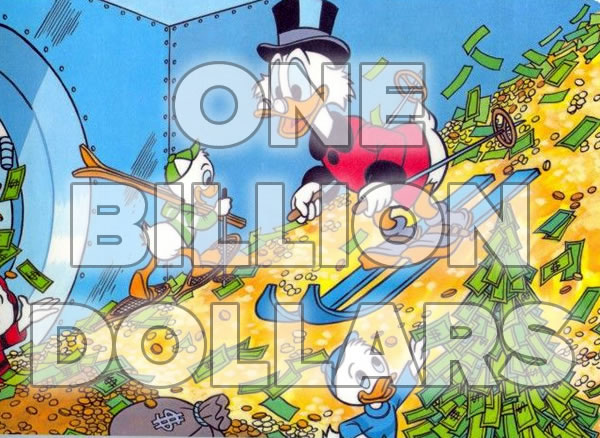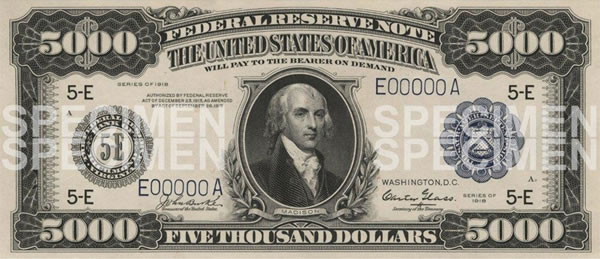
In case you’re not up on your finance lingo: EBITDA.

In case you’re not up on your finance lingo: EBITDA.

 Michael Bloomberg has made a lot of news lately, partly for his failed bid to become the Democratic Party’s presidential candidate, but mostly for the amount of money he spent on that bid: an estimated 1.2 billion dollars. You shouldn’t feel too bad for him: His estimated net worth is over $55 billion, and if even only 2% of that is liquid, that’s still 1.1 billion dollars.
Michael Bloomberg has made a lot of news lately, partly for his failed bid to become the Democratic Party’s presidential candidate, but mostly for the amount of money he spent on that bid: an estimated 1.2 billion dollars. You shouldn’t feel too bad for him: His estimated net worth is over $55 billion, and if even only 2% of that is liquid, that’s still 1.1 billion dollars.
The problem with large numbers like one billion is that they’re a difficult concept for many people to wrap their head around. Lately, I’ve been blowing people’s minds with the example I’m about to show you.

Suppose you’re an immortal being living in the city of Leiden in the Netherlands during the summer of 1620. It’s a pretty happening place — even back then, it had already been around nearly 800 years and a leading place of academia and science for almost half a century. Immortality has a few downsides, one of which is boredom, which you’re suffering from at the moment.
That’s when you hear some whispers in town. There’s a group of people who’ve chartered a ship with the auspicious name Speedwell to take them to them to a port city in England, join up with another ship, and then head to the New World to establish a colony. Finally, you think, something interesting.
You book passage on the ship, and after a harrowing voyage, which includes having to ditch the Speedwell because it’s unseaworthy and piling onto the other ship (the Mayflower), you sight what is now Cape Cod on November 9, 1620. You don’t actually make land for another two days.
After being cooped up on an overcrowded ship for over two months — and with a number of religious fanatics who would not shut up — you decided to enjoy some solitude and explore the woods by yourself. That’s when you find the magic dreamcatcher.

You know that it’s a magic dreamcatcher because the spirit living inside it says “Hey, dude, this is a magic dreamcatcher.” It also tells you that the magic in the dreamcatcher causes the piece of paper below to materialize in its “web” every morning at the moment of sunrise:

“Trust me,” the spirit says, “this will be actual currency someday.”
The spirit tells you that there’s a catch: as long as no one else sees the money that it magically creates, you’ll get a crisp new $5,ooo bill every morning. “Just stash it under a rock or something,” the spirit says, “and you’ll get a new one every morning. The moment someone else sees the money — and that includes investing it, or putting it in a bank, the magic stops.”
“At last!” you exclaim. “A way to make my fondest dream come true! I want to be…a billionaire!”
The spirit, being a money spirit, does some quick mental math and then says, “Good thing you’re immortal.”

You hang the dreamcatcher over your bed, and very next morning — November 15, 1620 — at the crack of dawn, you see a crisp $5,000 bill in its strings. You take the bill and put it in a safe hiding place. The next day, the same thing happens. And the next day, and the next day, and the next day…
Centuries pass, and finally, it’s today: Tuesday, April 21, 2020. You’ve been collecting 5 grand a day since Plymouth Rock.
Here’s the question: Have you collected a billion dollars yet?
(Scroll down for the answer.)

Between November 15, 1620 and April 21, 2020, a grand total of 145,889 days have passed. In that time, you’ve collected:
145,889 times 5,000 dollars, which makes $729,445,000.
729 and a half million dollars is a pretty nice sum, but it’s not even three-quarters of the way to a billion dollars.
What if you’d found the dreamcatcher a little sooner? How about over a hundred years earlier — say October 12, 1492, when Columbus made landfall in the Bahamas? You would’ve started accumulating bills 192,674 days ago, which means you’d have saved up $963,370,000. Not quite a billion, but close.
In fact, in order to be a billionaire today by putting away $5,000 each day without the money earning interest, it would take you 200,000 days to save up a billion dollars. You would have to start saving $5,000 a day starting a little over 20 years prior to Columbus’ landing: September 11, 1472.

Chances are that you can’t put $5,000 a day — that’s $182,000 a year — into savings. Even if you had that sort of money after all the expenses that go into living, you definitely don’t have over 500 years to spare.
That’s how big a billion is.
Now remember that:
(It also means that the most likely path to becoming a billionaire isn’t through trading your time for money, but through capital gains.)

Need context? It’s a reference to the Dunning-Kruger effect:
Thanks to Sue Edworthy for the find!

Last week, this announcement appeared on LinkedIn, and then disappeared after it was roundly mocked online:
Tap the image to see the stool-softeningly stupid post at full size.
That’s right: those lifestyle geniuses at Just Eat thought they’d just invented the lunch break (and perhaps Second Breakfast or Elevenses).
Here’s the text of the announcement:
This morning we launched the Just Eat Power Hour… our colleagues told us while in lockdown they were on back-to-back calls and found it difficult to take a break away from their screen. That’s not how we roll… so we’ve introduced the power hour!
It’s designed for Just Eaters to have guilt free time away from meetings, have lunch with the family, go for a walk (social distance), exercise – just breathe… it’s their time!
Another way we continue to ‘Brilliantly enhance the lives of Just Eaters everywhere!’
For more, see Gizmodo UK’s story: Just Eat Announces Wild New Concept of ‘Lunch Breaks’ and the Internet is Having a Field Day.
Here are some of the lunches we’ve had recently at the Pavka/deVilla household. Tap any of the photos to see them at full size.
March 20: Salami-wrapped cheese and salad.
March 26: Coleslaw, smoked mullet with kewpie mayo, Florida avocado from Bearss Groves topped with Trader Joe’s “Everything but the bagel” seasoning.
March 27: Smoked trout, vegetable stir-fry, Florida avocado from Bearss Groves topped with Trader Joe’s “Everything but the bagel” seasoning and kewpie mayo.
March 28: Scrambled eggs with greens and mushroom, jasmine rice topped with furikake.
April 2: Spinach salad, Florida avocado from Bearss Groves, shrimp, homemade cocktail sauce (it’s easy: ketchup, horseradish, lemon).
April 3: Dill pork loin, sautéed zucchini, plantains cooked in coconut oil, butter, and five spice, Swiss Chalet sauce (I maintain a local stash of packets that I buy whenever I’m in Toronto).
April 4: Tuna salad, english muffin, Florida avocado from Bearss Groves, coleslaw, cucumbers, organic tomatoes in freshly ground pepper and balsamic.
April 15: Salmon topped with salt, pepper, and dried lemon peel on top of garlic brown rice, collard greens cooked in garlic olive oil and Maggi.
April 16: Spinach salad topped with leftover sautées yellow squash, smoked trout with kewpie mayo, Florida avocado from Bearss Groves topped with Trader Joe’s “Everything but the bagel” seasoning.
April 18: Pork sisig, Mexican street corn from Gallito/Rooster and the Till, sautéed zucchini, shredded cabbage with kewpie mayo.